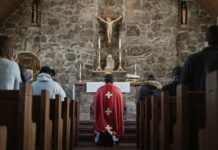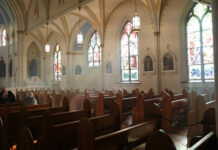 Prayer books are too often under read. Where this applies in my own life is ‘The Book of Common Prayer’ and the ‘Moravian Liturgy/Hymnal’. I have both, yet rarely look at them. It’s something I’m attempting to remedy.
Prayer books are too often under read. Where this applies in my own life is ‘The Book of Common Prayer’ and the ‘Moravian Liturgy/Hymnal’. I have both, yet rarely look at them. It’s something I’m attempting to remedy.
My reasons for not throwing myself into them includes a wariness of anything that might enable empty ritual, lifeless chanting or thoughtless routine. All three of which are in some way, shape or form negatively attached to liturgical call and response (order of service instructions), and scripted prayer.
Taking into account that the foundations of my own Christian journey, which begins in Catholic and ends in reformed Pentecostal and Evangelical-Anglican Churches, I don’t see this aversion as a simple bias. Pentecostal worship tends to also lend itself to repetition. Plus, many a musically gifted Pentecostal brother and sister can turn two minutes worth of words and chords into ten minutes of singing the same line over and over again.
I’m with lay preacher A.W. Tozer, who said:
“I cannot speak for you, but I want to be among those who worship. I do not want just to be part of some great ecclesiastical machine where the pastor turns the crank and the machine runs… Can true worship be engineered and manipulated? … Engineers do many a great thing in their fields, but no mere human force or direction can work the mysteries of God among men. If there is no wonder, no experience of mystery, our efforts to worship will be futile. There will be no worship without the Spirit.” [i]
I don’t want to be part of a detached mechanical process where we try to push the superstitious buttons so as to get God to “show up.” Repetition in this sense is not only pointless, it’s pagan. We cannot conjure up God as if we have some special power over Him. Though He chooses to receive even sighs as prayer, He is not at our beck and call. We cannot please Him by our performance at church any more than we can impress him by our church attendance records.
For starters, “to exist in the Church means to exist by and in the power of the resurrection of Jesus Christ… to be in the Church is to believe.” (Barth, 1942:291) [ii]
Jesus: “Where two or three are gathered in my name, there I am among them.” (Matthew 18:20 ESV)
In other words: God is there and is willing to be there.
This means that there is a place for liturgy and scripted prayer, just as there is a place for that ten-minute extension of a two-minute song.
There is a place for these. When the storm comes, the trained, not the charming, the most entertaining or talented, get the job done. When we’re left speechless, when our mind goes blank, reflexes kick in and that prayer we made an effort to learn by heart is recalled word for word. The repeated words of that worship song are remembered, bringing light into an otherwise dark moment.
The principle is simple. Repetition encourages talent. It sharpens skill. The untrained rescuer poses a danger to others as well as to themselves; the soldier, pilot or sailor acts on that training with great skill because over 90% of their time was dedicated to “boring” drills. The musician recalls notes with precision because of training that involved repetition.
Whilst I’m wary of liturgy and scripted prayer, I need to remind myself that the mechanisms which produce a “zombified” empty ritual, wrongly called worship, is not the full story.
The feasts of Israel, beginning with Passover, are designed to recall-with-precision God’s declaration and liberation of slaves from Egypt. This was to proclaim Good News, the news that recalls, “God will be our God and we will be His people”. Christmas and Easter, in their purer forms, are repeated annually for much the same reasons. There is a richness in liturgy and scripted prayer that can be mined and utilised for the betterment of an embattled world.
If, in our just recoil away from empty repetition, we jettison liturgy and scripted prayer, we jettison its usefulness. If that happens, we’re left the poorer for having done so.
Sources:
[i] Tozer, A.W 2009, Whatever Happened to Worship? Authentic Media (pp.11, 60-61)
[ii] Barth, K. 1942 The Passing & the Coming of Man, CD II/2 Hendrickson Publishers (p.291)
This article was originally published at http://www.rodlampard.com/










